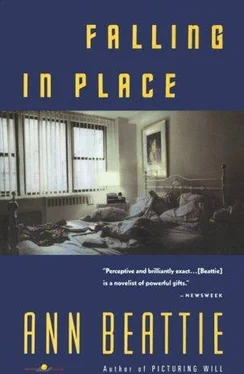Ann Beattie - Falling in Place
Здесь есть возможность читать онлайн «Ann Beattie - Falling in Place» весь текст электронной книги совершенно бесплатно (целиком полную версию без сокращений). В некоторых случаях можно слушать аудио, скачать через торрент в формате fb2 и присутствует краткое содержание. Год выпуска: 1991, Издательство: Vintage, Жанр: Современная проза, на английском языке. Описание произведения, (предисловие) а так же отзывы посетителей доступны на портале библиотеки ЛибКат.
- Название:Falling in Place
- Автор:
- Издательство:Vintage
- Жанр:
- Год:1991
- ISBN:нет данных
- Рейтинг книги:4 / 5. Голосов: 1
-
Избранное:Добавить в избранное
- Отзывы:
-
Ваша оценка:
- 80
- 1
- 2
- 3
- 4
- 5
Falling in Place: краткое содержание, описание и аннотация
Предлагаем к чтению аннотацию, описание, краткое содержание или предисловие (зависит от того, что написал сам автор книги «Falling in Place»). Если вы не нашли необходимую информацию о книге — напишите в комментариях, мы постараемся отыскать её.
Falling in Place — читать онлайн бесплатно полную книгу (весь текст) целиком
Ниже представлен текст книги, разбитый по страницам. Система сохранения места последней прочитанной страницы, позволяет с удобством читать онлайн бесплатно книгу «Falling in Place», без необходимости каждый раз заново искать на чём Вы остановились. Поставьте закладку, и сможете в любой момент перейти на страницу, на которой закончили чтение.
Интервал:
Закладка:
“I was wondering why you weren’t at work,” she said.
“I had to have a conference today with my daughter’s English teacher.”
“Well,” Cynthia said, “I’m glad you took the English teacher to lunch. She was hungry, and she doesn’t like sitting around that classroom.”
“You write on the blackboard,” he said.
“Yes,” she said. “Quite a few teachers, I think… ”
“I just meant that I forgot that information gets communicated that way. I’m used to memos. I guess you couldn’t very well send the students memos about Thackeray and have them initial them and send them back.”
“What?” She laughed. She picked up her glass of wine and had a drink the minute the waiter put it on the table.
“Footing the bill, too?” she said. “The English teacher is almost broke.”
“Sure,” he said. “Of course.”
“This is odd,” she said. “This isn’t what I thought I’d be doing today.”
“I was hungry,” he said. “I was embarrassed, thinking you could hear my stomach growl.”
“I didn’t.”
“You didn’t,” he repeated. He picked up the menu. He wanted six cheeseburgers. If he only had one drink, he would order a turkey sandwich. If he had two, he would order a cheeseburger.
“In answer to your question,” she said, “I know that your daughter can read the books and understand them, and that she can write about what she knows, if she wants to. I do not have that feeling about everyone in the class. I do have the feeling that she doesn’t care, that it isn’t cool to care, and that neither you nor I can probably make her care.”
“I like what you said about there not being one answer for things,” he said.
“What do you mean?”
“You said, when I asked why she was doing poorly, that there wasn’t any one answer.”
“I know,” she said. “I mean, what do you think the answers are?”
“I agree with you,” he said. “They’re fifteen years old now and it isn’t cool to care.”
“And what else?” she said.
“She thinks Thackeray is irrelevant. It’s summer—”
“I don’t know if it’s important whether it’s irrelevant or not. I mean, I don’t think it is irrelevant, but those aren’t even terms I think in.”
She took a drink. He took a drink. He was afraid that if he asked her what she did think, she might tell him, and it might surprise him. It was too early in the conversation to ask what she was thinking.
“When I feel like giving up — not showing up to teach — when I’m in a bad mood, I see it their way. I see the absurdity of thinking about any time but our own. I can see wanting books to hit me over the head and tell me what to do about my problems. I don’t want to know what the Odyssey has to do, indirectly, with my problems: I want Ann Landers.”
“But Ann Landers is predictable. You have to distrust those answers because of that.”
“Is she?” Cynthia said. “I don’t read Ann Landers.”
She had almost finished her wine. It was a small glass. He got the waiter’s attention and ordered another glass of wine, and before he was tempted, another drink and a turkey sandwich to be brought at the same time. She ordered a salad.
“Why fight it, I guess,” Cynthia said. “It was predictable that I’d order a salad and you wouldn’t.” She fiddled with her napkin. “You can get caught up in that — thinking that because you can make everything seem ironic, that things genuinely are. You can put an ironic front on anything. I felt sort of the way they must feel — the way I think they must feel — when I was younger than they are. In grade school, when we used to go down to the cafeteria and sit on the floor and put our hands over our heads — what we were supposed to do if the bomb dropped, if the bell went off for real and a bomb dropped. Then we’d file upstairs and hear about Washington crossing the Delaware. But everybody’s had that experience, or a comparable experience. Constantly. I’m not so sure that these times are as mind-blowing as those kids pretend. I’m not sure that they aren’t just lazy, and that it isn’t easy to be lazy.”
While she talked, he looked at her hands. They were small hands, thin, with long fingers — a young woman’s hands. How was it possible that Louise’s hands were so much larger? How could hands get bigger as you got older? She was staring at the tabletop.
“What are you thinking?” he said.
“Oh,” she said, shaking her head in apology. She shook her head again. “I was thinking about a friend of mine who has nightmares about the bomb. Very specific nightmares. He dreams that it’s exploding, and he’s not supposed to look at the fireball.” She took another drink. “This is an odd conversation to be having. Did I start this odd conversation?”
“I don’t remember.”
“Did we somehow get to Spangle and the fireball by way of your daughter’s problems in summer school?”
“Spangle?”
“That’s his name. He’s in Madrid, trying to talk his brother into coming back to the States to reenroll in law school. Ann Landers would say he’s doing the right thing, right?”
“I imagine,” he said. He was tapping the salt and pepper shakers together. “I’m glad you wanted to come to lunch,” he said.
That seemed to be the wrong thing to say. For some reason, that seemed to embarrass her, while other things hadn’t. She sat up a little straighter and didn’t say anything. He looked at some of the other people in the restaurant. It was definitely not a restaurant in New York at one o’clock. The middle-aged women leaned forward or sat close together like conspirators, and the few younger women in the restaurant seemed formal, stiffer, almost alienated from each other. He saw only two other pretty women, neither one as pretty as Cynthia. And he suddenly remembered part of the reason he had dreaded meeting her: that notice she had sent around, with a picture of herself on the top, like an egomaniac’s stationery. Perhaps she had done it as an ironic frame.
“On the off chance that I get drunk,” he said, “tell me what ideas you have, if any, about how Mary could pass the course.”
“Tell her to come see me. I asked her to twice, and she didn’t. If she and I could work it out privately — if nobody else has to know that she cares about passing the course but Mary and me — maybe she’ll be more willing to try. We can hush it up that she cares.”
“All right,” he said. He moved his hands above the tabletop, crossing one over the other. “Now you don’t see them,” he said, when his hands were over the salt and pepper shakers. “Now you do.” He moved his hands again. “You don’t care, and then you do.”
She was staring at him, with her mouth open.
“What?” he said, smiling nervously.
“What you just did,” she said. “What a coincidence. I was thinking about a magician, and that was such a strange thing to have happened.” She picked up her wine glass and put it down. “There’s a man in New Haven, where I’m living, who turned up last night. I met him a little while ago, at a laundromat, and last night when I was going out I bumped into him again, except that I had the spooky feeling that I didn’t really bump into him, that he had been out on the street on purpose.” She picked up the glass again and took a drink of wine. “Never mind,” she said. “I’m sorry. I didn’t get much sleep last night because the damned fan doesn’t work.”
“No,” he said. “Go on.”
“Oh, he’s just a harmless eccentric, I’m sure, but it was so strange seeing him again, and he wanted to have the exact conversation we’d had before, in the laundromat. That didn’t make sense, because it was obvious that he recognized me. He stopped and said hello, and I said hello to him, and he turned and started walking in my direction, and he started to tell me all over again how he was visiting his mother in New Haven, that he lived in California. I was sure he had the same things to do tricks with in his pocket.” She shook her head. “This is silly,” she said. “Forget it.”
Читать дальшеИнтервал:
Закладка:
Похожие книги на «Falling in Place»
Представляем Вашему вниманию похожие книги на «Falling in Place» списком для выбора. Мы отобрали схожую по названию и смыслу литературу в надежде предоставить читателям больше вариантов отыскать новые, интересные, ещё непрочитанные произведения.
Обсуждение, отзывы о книге «Falling in Place» и просто собственные мнения читателей. Оставьте ваши комментарии, напишите, что Вы думаете о произведении, его смысле или главных героях. Укажите что конкретно понравилось, а что нет, и почему Вы так считаете.












